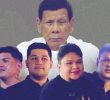Because this innovative approach of new politics has apparently gained popularity, it is loathed by the likes of Justice Secretary Raul Gonzalez precisely because it can disenfranchise the powers that be by raising the political consciousness of the people. Bereft of visions and programs that address the people’s democratic interests, they trivialize the elections through manipulation, disinformation and the spreading of more myths.
By the Policy Study, Publication and Advocacy Program
Center for People Empowerment in Governance
MANILA — The campaign period for the coming May legislative election is about to begin. Unlike previous elections, however, this is one poll in which cynicism and indecisiveness bug sections of the mass electorate: Will they vote, and if they do, whom will they vote for? This situation stems partly from the infirmities and credibility problem that buffet the electoral process owing to recent monumental cases of fraud and the vicious cycle of installing and reinstalling mediocre and corrupt officials.
Just the same, the elite-manipulated elections offer some opportunities for building a wider constituency of reform-minded politicians and advancing a progressive agenda of genuine socio-economic reforms. Moreover, the election can elect a sufficient number of oppositionists in the lower House that can make a third impeachment move against Mrs. Arroyo prosper.
Meanwhile, it would be like a cutting edge if the election season is able to open a new territory � a campaign of demystification that will lay bare the myths, falsehoods and distortions that usually proliferate during this period. The result can be a more politically-aware electorate and the judicious exercise of the right to vote.
One of the myths that the incumbent administration is trying to propagate is to project an image as a graft-buster – justifying the current purge of local chief executives as part of its campaign for clean government. Last week, Interior and Local Government Secretary Ronaldo Puno set a deadline against at least two governors and several mayors to vacate their positions, citing Ombudsman directives on their dismissal for graft complaints.
Providing spectacular drama and media mileage to this “campaign” is the Jan. 17 police raid on the Capitol building in Iloilo to bodily remove Gov. Niel Tupas, Sr., 74. As expected, anti-Arroyo opposition leaders have cried foul to the purge claiming that most of the targets are identified with the opposition camp and the move therefore appears to be politically-motivated.
The question that immediately arises is why this purge is taking place now as the election approaches � and when the official record speaks of non-performance by the Arroyo administration in curbing graft and corruption? Where is the logic in all this considering the administration’s lack of competence in doing so after having been listed consistently by the Transparency International (TI) and other corruption watchdogs as the second most corrupt government in Asia? The purge is questionable because its own initiator has a credibility problem.
2007 Elections









